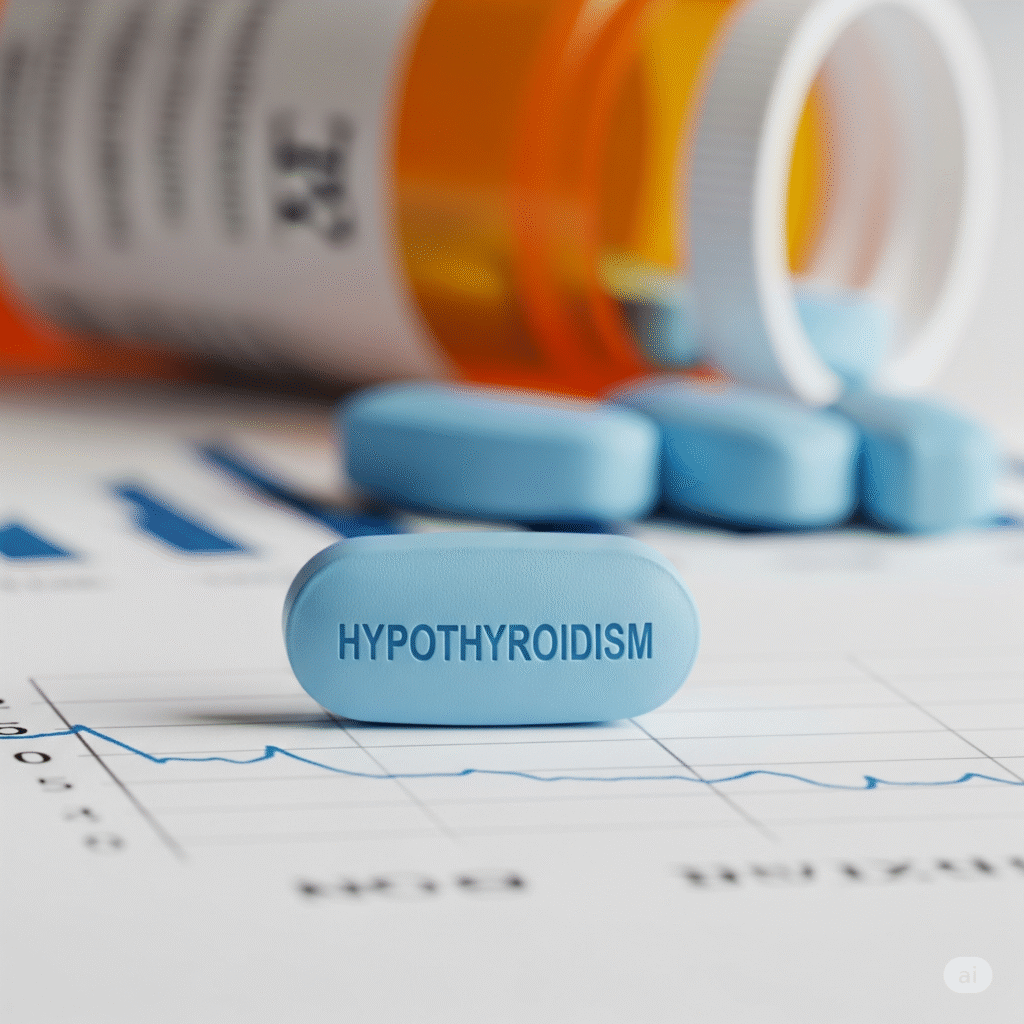Hypothyroidism
Introduction
Hypothyroidism is a condition in which the thyroid gland does not produce enough thyroid hormones (mainly T3 and T4). These hormones are essential for controlling the body’s metabolism, which affects many bodily functions like heart rate, digestion, and energy levels. When hormone levels are low, the body’s processes slow down, leading to symptoms like fatigue, weight gain, cold intolerance, and depression.
It is more common in women and can affect people of all ages. If not treated, it can lead to serious health problems, but with proper medication, it can be well-managed.

Types of Hypothyroidism
Primary Hypothyroidism
Caused by a direct problem in the thyroid gland, such as autoimmune diseases (like Hashimoto’s thyroiditis), iodine deficiency, or thyroid surgery.
Secondary Hypothyroidism
Occurs when the pituitary gland fails to produce enough TSH (Thyroid Stimulating Hormone) to stimulate the thyroid.
Tertiary Hypothyroidism
Caused by a problem in the hypothalamus, which fails to release TRH (Thyrotropin-Releasing Hormone) to activate the pituitary gland.
Subclinical Hypothyroidism
A mild form where TSH levels are slightly elevated but thyroid hormone levels (T3, T4) remain normal, often with few or no symptoms.
Clinical features of Hypothyroidism:
Tiredness
The person feels constantly tired and less on energy due to a slow metabolism.
weight gain
Due to decrease in metabolic rate, unexpected weight also occurs without an increase in food.
cold intolerance
Due to decrease in heat production, individuals feel unusually cold, even in a warm environment
Dry skin and hair
The skin becomes rough and dry, and the hair can become brittle or fall out.
constipation
Low thyroid hormone levels can lead to immoral or difficult bowel movements from dull digestion.
Symptoms associated with Hypothyroidism
Feeling weak or lacking energy throughout the day.
- easily gain weight with normal or low food intake.
- feel cold at all times, even in hot weather.
- The skin becomes rough, dry and flashed.
- hair becomes thin, brittle, or falls easily.
- Difficulty in passing low bowel movements or stools.
- feeling sad, less, or emotionally dull.
- The heart beats at a slower by normal, causing fatigue or dizziness.
Investigations in Hypothyroidism
- The most important test for detection of hypothyroidism.
- In primary hypothyroidism, TSH is high as the body is trying to stimulate the underactive thyroid.
Measures the amount of thyroid hormone active in the blood.
In hypothyroidism, free T4 is low, confirming low hormone levels.
Sometimes the thyroid function is used to assess, although it is usually normal in early or light hypothyroidism.
Checks for anti-TPO (thyroid peroxidage) and anti-thyroglobulin antibodies.
Positive in autoimmune hypothyroidism like Hashimoto’s thyroiditis.
The thyroid is used to check the size, size and structure of the gland, especially if a lump or swelling is felt.
Hypothyroidism can increase cholesterol levels, so a lipid profile helps to assess heart risk.
Mild anemia can show, which is sometimes associated with hypothyroidism.
Other conditions were done to dismiss or investigate complications in prolonged cases.
